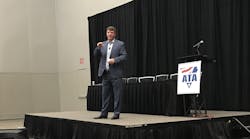AUSTIN, TX. As the Federal Motor Carrier Safety Administration (FMCSA) considers changes to hours-of-service rules, the agency’s chief counsel said the use of electronic logging devices (ELDs) is making the process easier.
“But for ELDs we probably would not be going through this process,” Jim Mullen said at the annual meetings of American Trucking Associations.
He said less than 1% of drivers have been caught without an ELD during 1.5 million roadside inspections since April, and that HOS violations have fallen nearly 50%.
The industry’s compliance is “assisting greatly” as FMCSA considers a variety of changes that could offer drivers greater operational flexibility.
Mullen, who previously was general counsel for truckload carrier Werner Enterprises, declined to discuss a timeline for making changes, but said FMCSA would be transparent throughout the process.
Currently, the agency is reviewing the more than 5,000 comments that have been filed in areas including livestock exemptions, the 30-minute rest break, the split sleeper berth provision, the short haul exemption, the ability to extend the work day when facing adverse driving conditions, and the ability to pause the 14-hour clock.
If FMCSA decides changes should be made, it would need to file a notice of proposed rulemaking, which then kicks off an additional public comment period.
During a question-and-answer session following Mullen’s presentation, several fleet executives raised concern with the December 2019 deadline to fully transition to ELDs.
The mandate allowed fleets that had previously installed automatic onboard recording devices (AOBRDs) to continue using them for two years.
One fleet executive went so far as to suggest there should be an extension to allow additional time to train drivers on the new devices they will need to use.
Jack Van Steenburg, FMCSA’s chief safety officer, was in audience and said it was the first time he had heard these concerns and that there was “no internal discussion” regarding a delay.
However, he said the discussion served as a reminder for FMCSA to be more proactive in issuing reminders and updates regarding next year’s deadline.



